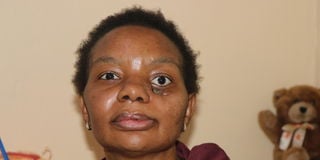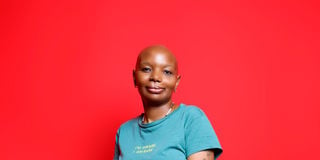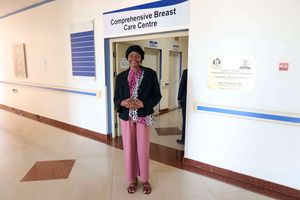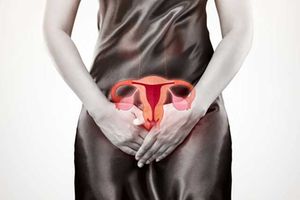Teresiah’s story of resilience in the face of stage four rare and relentless cancer

Teresiah Njeri, who is battling a rare type of cancer called adenoid cystic carcinoma, during the interview at her home in Utawala, Nairobi on February 18, 2025.
What you need to know:
- Her jaw was removed as doctors fought to save her from cancer. To keep fighting, she takes 20 tablets a day, and this month, she is scheduled to go back to India for another life-saving treatment at a cost of Sh1.5 million, money that she is fundraising.
"My name is Teresiah Njeri. I am a 38-year-old mother of one and a teacher by profession.
In March 2020, my life took an unexpected and devastating turn when I got diagnosed with adenoid cystic carcinoma, a rare and aggressive form of cancer. I had no warning signs—no indication that a silent battle was unfolding inside my body.
It all started with a seemingly harmless ache at the nape of my neck. The discomfort felt like a muscle strain. My movement was restricted, making it difficult for me to turn my head. I dismissed the discomfort as fatigue and carried on with my work.
However, the pain persisted, forcing me to seek medical attention at Kenyatta National Hospital (KNH). Doctors prescribed migraine medication despite the fact that I had never suffered migraines.
The following morning, I skipped work and sough a second opinion. Accompanied by my neighbour, I went to Mbagathi Hospital, where doctors immediately noticed that my vitals were alarmingly high.
What started as a routine check-up quickly escalated into an emergency situation. I was rushed to an emergency room in a wheelchair. Doctors conducted multiple tests to diagnose the issue. A CT scan revealed that I had a large tumour on the left side of my face.

Teresiah Njeri, who is battling a rare type of cancer called adenoid cystic carcinoma.
This marked the beginning of my long and grueling fight against a relentless cancer, one that has tested my strength, resilience, and will to live.
The next day, I went back to the hospital for further tests. A sample of the tumour was taken for biopsy to determine whether it was cancerous.
Two weeks later, the results came out. I had adenoid cystic carcinoma – a rare form of cancer that most commonly develops in the salivary glands or other regions of the head and neck. I received the news with shock and disbelief.
Was this really happening to me?
At that point, everything changed in an instant, and I knew right away that life would never be the same.
I called my aunt, mother and siblings to break the news. They were all shocked because no one in the family had ever been diagnosed with any type of cancer.
I sought a second opinion from a private hospital, where it was confirmed that I had the cancer.
On April 16, 2020, I was wheeled into theatre at KNH for my first surgery, which took nine hours. That morning would be the last time I chewed food. At the recovery ward, it hit me that I was very ill. Doctors had removed my left jaw and replaced it with a metallic gadget that would allow me to speak.
My life changed completely. I was introduced to blended food.
Upon being discharged two weeks later, I moved in with my aunt, who became my full-time caregiver.
Acceptance was a challenging part of the journey, especially since the structure of my face had changed, and having my aunt by my side to guide, support, and remind me of my worth made all the difference. She also helped my daughter to cope with the new version of me.
But despite my family’s support, there were times I would look at myself in the mirror and feel a flood of emotions.
When results from the surgery came back, they showed that the cancer was hyperactive and I needed to undergo radiation therapy. I started the sessions in May until August. In total, I underwent 35 sessions.
My body’s reaction after the radiotherapy was drastic. My weight dropped from 55 to 22. I developed sores in the mouth, and feeding became a problem.
I spent the rest of the year sickly and always in pain. In January 2021, I started feeling like nobody loved me. I also felt hopeless and had suicidal thoughts. I wanted to end my life to escape the pain, but I survived.
I turned to God and pleaded for strength to push through.
A few weeks later, I received good news. My six-month check-up results indicated that the radiation treatment had worked, and that the cancer was gone. I started accepting myself, my health improved, and my old jovial self returned.
In 2022, I joined a support group called Lady Hope Wellness, where I felt loved once again. But in May of the same year, the cancer returned. I had gone to hospital for follow-up clinic when the doctor said that something was growing in my body. Soon after, I underwent a second surgery at Nairobi Hospital.
By the end of May, I was done with the surgery, and my condition improved. In November, I underwent a PET scan, and the doctor said I had gone into remission. Everything was okay, once again, until March in 2023, when my aunt died.
Her death hit me hard. She had supported me financially, emotionally and physically, and now she was gone. Being a single mother with a daughter heading to secondary school, I got anxious. Who would pay her school fees? I wondered.
Luckily, she performed exceptionally well in her Kenya Certificate of Primary Education exams and got awarded a scholarship. This lifted the burden of school fees off my shoulders.
I opened a shop and started selling clothes. However, the reprieve was temporary. On October of that year, I started having an itchy feeling inside my mouth. I noticed an open sore in the mouth and went to the doctor. He said the cancer was back, and since it had formed a wound, nothing could be done.
The wound was bleeding and oozing pus. It emitted a foul smell, forcing me to avoid interacting with people. The doctor informed me that the cancer had spread to my lungs. He said that I had just a few days to live, but suggested that I could go to India and try my luck.
I went back home and started figuring out how to raise funds for a trip to India for treatment. I come from a humble background. My mother is not financially stable; I am my daughter’s sole caregiver, and my aunt, who used to foot my bills, was gone. My savings were also minimal.
With no other option, I took a picture of the wound and posted it on Facebook, narrating my journey with cancer. I got well-wishers, including Tiktok influencers, who helped fundraise Sh2.6 million for the trip.
On December 15, 2023, I travelled to India, where I found out that the cancer was now at stage four. I started chemotherapy, but had to come back home after exhausting the funds. Before travelling back, my doctors prescribed anti-cancer tablet medication - tablets or capsules that contain chemotherapy, hormone therapy, or targeted therapy drugs.
However, the side effect of this medication was extreme pain on the left side of the face, which would make me convulse. Doctors thus gave me a special pass to purchase morphine over the counter. When I completed the dosage last year in May, I went back to India having fundraised Sh1.5 million.
My doctor said the chemotherapy had worked and that the cancer was stable. The wound dried up and shrank. The doctor put me on anti-cancer medication and advised me to undergo immunotherapy - a cancer treatment that uses the body's immune system to fight cancer. I then travelled back to Kenya in August 2024.
That same month, I started immunotherapy at Kijabe Hospital and completed it on January 20 this year. However, after the sessions, the metallic plate that sits on my jaw was affected, and its upper part, which sits just below my left eye, punctured my skin. The plate is still protruding, and has a wound on the inner side of the site.
When it’s cold, I feel pain at the site of the wound. Besides, because of my low immunity and occasional struggles with breathing, I have to stay indoors lest I catch a cold and worsen the situation.
I will be going back to India this month to see what the doctors will do. They will also advise on tumours that have spread to my lungs. In the meantime, I take a total of 20 tablets per day, while I continue fundraising for Sh1.5 million to cover my travel and treatment costs."
About adenoid cystic carcinoma
Dr Wahome Karanja, a consultant ear, nose and throat (ENT), rhinology and skull based surgeon, describes adenoid cystic carcinoma (ACC) as a rare form of cancer.
He explains that the cancerusually starts in the salivary glands, which are found in and around the mouth and throat. It can also occur in other glands such as those in the tear ducts, the lungs and even the skin.
"Unlike many other cancers that grow quickly, adenoid carcinoma tends to grow slowly. It spreads along nerves and can come back even years after treatment or after removal. What makes ACC different from other cancers is that it's not linked to common risk factors like smoking or alcohol use. Further, it does not respond well to regular medications or chemotherapy," he says.
"Although it grows slowly, it is persistent and difficult to completely remove from the body, making long term monitoring necessary even after the initial surgery to detect any potential relapse or spread of the disease,” he adds.
The specialist explains that the cause of the cancer is not quite known, but a number of factors such as genetic mutations may increase the risk. Changes in the DNA have been linked to the cancer even though it is not inherited.
He adds that prior radiation exposure to the head and neck area can significantly increase the risk of developing adenoid carcinoma.
"ACC usually appears as a small, painless lump that grows slowly. Since it is not painful at first, many people ignore it, delaying diagnosis. The symptoms depend on where the tumour is located.
"So, if the salivary glands, which are the most common site, are involved, you have a lump that's near the jaw, under the tongue or behind the ear. If it's the face and the nerves, then you have a bit of numbness or tingling in that area or even weakness in the face. And if it's in the throat and airways, you may have difficulty swallowing, breathing problems or even a cough that is hard to clear," he explains.
Dr Wahome notes that if it's around the eye and tear glands, you can have a swelling around the eye or even vision problems.
“But one unique feature of adenocystic carcinoma is nerve invasion, meaning it spreads along nerve pathways. And this can cause facial pain, paralysis, reduced movement of muscles around the face or unusual sensations, which can be the early warning signs," he adds.
He explains that doctors use several tests to diagnose ACC. The first one is a physical examination, where a doctor presses on the body with their fingers to detect any lumps, and checks for nerve issues around the facial weakness or pain. CT, MRI and PET scans help doctors to be able to see the tumour and check if it has spread.
"There's also a biopsy, whereby a small piece of the lump is taken and examined on a microscope to confirm the diagnosis of ACC. Genetic tests may be done in some cases , where doctors test the tumour for specific genetic changes," he explains.
According to Dr Wahome, treatment of ACC depends on the location and stage of the tumour. The main treatment is surgery, which is said to be the most effective in terms of removing the tumour along with some of the surrounding tissue.
The second form of treatment is radiation therapy, usually done after surgery. Radiation is used to kill remaining cancer cells, lower the chance of recurrence and slow down the growth of the tumour in cases where surgery is not possible.
"However, ACC is somewhat resistant to radiation, meaning it may not completely destroy all the cancer cells," says Dr Wahome.
The third one is targeted therapy and clinical trials. Some patients with advanced ACC may be eligible for newer treatments that are being studied.
"Researchers are working on better treatments, which include targeted therapies, where drugs are used to block specific genetic mutations in ACC cells. Others include immunotherapy, where you boost the immune system through some medications to help fight the cancer, and advanced radiation techniques such as proton therapy, which delivers radiation more precisely to the cancer. While these treatments are promising, they're still in the early stages and are widely available, especially in Kenya and the region," says Dr Wahome.
The specialist notes that ACC can have serious long term effects on a patient's life. These include facial disfigurement in cases where surgery removes part of the jaw, the tongue or other facial structures, chronic pain and nerve damage, which may lead to facial numbness or even paralysis of muscles, as well as breathing and swallowing difficulties, which occur if the tumour affects the throat or the airways.
"Due to these challenges, patients may need reconstructive surgery, speech therapy or long term pain management. The management of adenoid cystic carcinoma is a multidisciplinary approach. Head and neck ENT surgeons remove the primary tumour, plastic and reconstructive surgeons come up with their reconstructive techniques, while speech and language therapist manage the effects on breathing and swallowing," explains Dr Wahome .
He adds that newly diagnosed patients need to get a second opinion. “ACC is rare, so consult an otolaryngologist, or an ENT specialist, a doctor who diagnoses and treats head and neck cancers. Secondly, seek treatment in specialised centers," advises Dr Wahome.
Adenoid carcinoma, says Dr Wahome, is a rare tumour, with an estimated incidence of only one to two cases per million people annually, making it a relatively uncommon cancer globally. In Kenya, the exact numbers are unknown, but it's occasionally diagnosed in major hospitals.
Challenges that exist in diagnosing and treating ACC in Kenya include lack of awareness, leading to late diagnosis. Patients also have limited access to advanced treatments since only a few hospitals offer specialised cancer care in terms of diagnosis, surgery and radiation or chemotherapy. Patients also have to contend with high treatment costs, making surgery and radiation unaffordable for many patients.
"If you notice a lump in your mouth, jaw or throat that does not go away, get checked. If you have any unexplained facial pain, numbness or weakness, that should not be ignored. Early diagnosis improves treatment outcomes,” says Dr Wahome.





